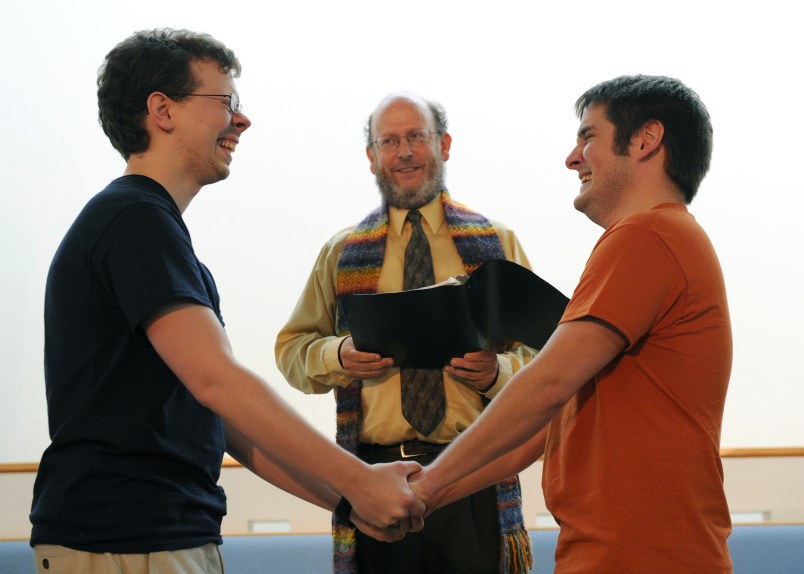Marriage went viral yesterday—and no I did not leave a word out. I’ve never seen so much discussion, so many gifs, so many memes and pull-quotes and hashtags (#lovewins), so much liking and celebrating over matrimony. Sure, ostensibly yesterday’s social media bonanza was a celebration of the Supreme Court’s decision to award same-sex couples the right to marry, but what the court did, and what we’re all celebrating, isn’t equality, but the institution of marriage itself.
It’s telling that the piece of text I saw quoted most yesterday—both in news articles and on friends’ Facebook feeds—was not about how great gay people are, or about what true equality means, but about the sanctity of marriage.
It was from Justice Anthony Kennedy, who wrote in the court’s 5-4 majority opinion:
No union is more profound than marriage, for it embodies the highest ideals of love, fidelity, devotion, sacrifice, and family. In forming a marital union, two people become something greater than once they were. As some of the petitioners in these cases demonstrate, marriage embodies a love that may endure even past death. It would misunderstand these men and women to say they disrespect the idea of marriage. Their plea is that they do respect it, respect it so deeply that they seek to find its fulfillment for themselves.
I don’t begrudge anyone who wants to get married, and as a gay man I don’t want to trivialize the importance of the court’s decision, but I think it’s important to note that yesterday was not a win for all lesbians, gays, bisexuals, trans women and men, and gender-non-conforming people, but for those who want to and who can partake in the privileges of marriage. Same-sex couples, of course, should have as much right to partake in that institution as anyone else, but we should question why so many believe marriage is the ultimate signifier of equality.
Marriage is an institution based on outmoded and harmful ideals about monogamy, patriarchy and property ownership that the U.S. government has chosen to reward people (literally, in the form of tax benefits) for participating in. And our popular culture reinforces that system by presenting marriage as both morally sanctified and inevitable—the modus operandi of a good American life, despite the fact that marriage has a staggering failure rate and the fact that the “normal” American two-parent household statistically doesn’t exist.
Marriage is intensely important for some. But it’s not equality. Trans people are still being killed at alarming rates, LGBTQ people make up 40 percent of the youth homeless population, and the economic divide between gay, queer and trans people of color and whites is growing (see these two good posts about those issues; shout out to Hampshire College professor Susana Loza for turning me on to those pieces).
One (rich, powerful, largely white, cisgender, super-problematic) segment of LGBTQ rights movement has unfortunately but quite intentionally conflated marriage with equality. The Human Rights Campaign, which almost exclusively focuses on marriage and which is one of the largest gay nonprofits in the world, has even managed to make the equal sign the most popular representation of the gay marriage fight. A few hours after the ruling, the Southern Poverty Law Center posted a cartoon in which the Confederate Flag is taken down and the rainbow flag replaces it, as if the country’s endless and countless tragedies of racist violence can be solved by awarding a limited segment of the population the right to partake in a deeply flawed institution.
The influence of that conflation could be seen in full effect yesterday, with politicians, the media, and my parents all celebrating as if LGBTQ people had achieved something great, beyond the right to participate in an inherently flawed system. Of course the court’s decision is important, historic and all the rest, but we need a better metric for equality.
On a positive note: If the amount of elation expressed by many Americans yesterday was indeed for such a narrow victory, I’m expecting a blowout when true equality is achieved.
Peter Moskowitz is a writer and journalist from New York. He’s writing a book about gentrification.







Interesting and insightful observations, certainly important enough to spend some time thinking about. What I have read has certainly emphasized the right for equality not for just marriage, sexual differences but for everyone. It is one nation created equal, not one nation created for wealthy white males and (sigh) I suppose we have to include women too, but those “others” …not so fast.
I don’t begrudge anyone who wants to get married, and as a gay man I don’t want to trivialize the importance of the court’s decision
Funny, because those seem to encompass the entire point of this piece.
It’s totally cool that you’re not jazzed about marriage! It’s not for you, and that’s fine. The thing is? It’s now your choice to not partake, instead of not having a choice at all.
Marriage, and its hundreds (thousands?) of benefits, both societal and legal, is now a viable, legal and available choice for gay folks.
“…we should question why so many believe marriage is the ultimate signifier of equality…” This is news to me. I’ve not heard nor read anywhere that anyone thinks this is the case. I think this is a bit disingenuous of the author of this piece. Marriage equality is but a part, not the whole, of liberty and justice for all, and just about everything I’ve read has suggested that, while momentum is definitely gaining, there is soooooo much more work to do.
The whole premise here is a giant straw man—claiming that marriage equality isn’t equality in all things.
Well, duh!
So the author dislikes the concept of marriage—BFD.
He’s either stupid or he’s deliberately missing the point here.